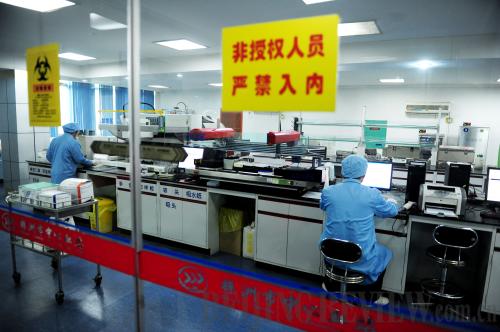|
 |
|
THOROUGH EXAMINATION: Staff members at a blood center in Zhuzhou, Central China's Hunan Province, conduct HIV tests on blood samples (IC) |
Zeng suggests not labeling the disease as "bizarre" or "AIDS-like", saying a casual definition may mislead people into believing that the disease is an epidemic, and cause unnecessary confusion.
"There is no need to panic over adult-onset immunodeficiency and it is also too early to conclude that such immunodeficiency occurs only among Asian people," Zeng said.
Wu also said that understanding a new disease is a gradual process. "When AIDS was first reported in 1981, its cause was also unknown, but doctors noticed that homosexuals, drug addicts, and patients who had received blood transfusions were susceptible to the disease, and hence suspected the disease was transmitted through blood and sexual intercourse. It wasn't until years later that doctors were able to confirm HIV as a contagious disease," he explained.
In China, groups of people reportedly suffer from HIV-negative AIDS. Such people claim to display symptoms very similar with those of AIDS, such as swollen lymph nodes, subcutaneous bleeding, joint pain, fatigue, night sweating and loss of weight, yet they test negative for HIV. Medical experts dismiss the phenomenon as mass hysteria.
After learning about the newly reported AIDS-like disease, there has been concern whether it is the same as the so-called HIV-negative AIDS.
Wu said that the two are completely different. "In the case of the recently reported AIDS-like disease, patients' immune deficiency was proven with clinical and laboratory evidence, whereas HIV-negative AIDS is exclusively self-diagnosed," he said.
According to Xinhua News Agency, the Ministry of Health of China first received reports of HIV-negative AIDS in June 2009. Wu estimated that there are hundreds of people who claim to suffer from the disorder.
The Beijing Times recently reported a case about Sun Li, a man who reportedly suffers from HIV-negative AIDS. Sun noticed symptoms in August 2010. Soon, his wife and son also complained about such symptoms.
Since Sun once had unprotected sex, he suspected that he might have contracted AIDS. He went for an HIV test, but tested negative. Sun and his family had undergone many medical examinations, which all indicate that nothing was wrong with them.
Later, Sun and 59 other self-proclaimed sufferers of HIV-negative AIDS were reexamined by Zeng, and again, the results of their HIV tests were negative.
The Ministry of Health said in May 2011 that no new or unknown viruses had been found among people claiming to suffer from HIV-negative AIDS, and the cause of their AIDS-like symptoms had yet to be determined.
From March to May 2011, sufferers of the "disorder" went to Guangzhou in southern Guangdong Province to receive examination by epidemiologist Zhong Nanshan. Zhong found that these people are ill to different degrees, and their illnesses were caused by known rather than unknown viruses.
Of all the 60 people tested for six common pathogens including the Epstein-Barr virus (EBV), 48 were found infected. Thirty-three people, including Sun, were found to be EBV positive.
EBV can be transmitted through saliva, and that may explain why Sun's wife and son also showed symptoms, Zhong said.
Zhong said that these pathogens can invade white blood cells and affect the immune system, causing subjectively similar symptoms.
Twelve people in the group also voluntarily received psychological tests, and seven showed abnormalities: Five had hypochondriasis, one had anxiety and one was slightly depressed.
Most of the HIV-negative AIDS patients were found to suffer from psychological AIDS phobia or other mental stress, according to Zeng. The symptoms of some HIV-negative AIDS patients relieved or even disappeared after their psychological problems were addressed.
Zeng told Xinhua News Agency although it might be possible that some HIV-negative AIDS patients may well be those caught with adult-onset immunodeficiency, there is no need to panic because the disease is not contagious.
Email us at: wanghairong@bjreview.com | 